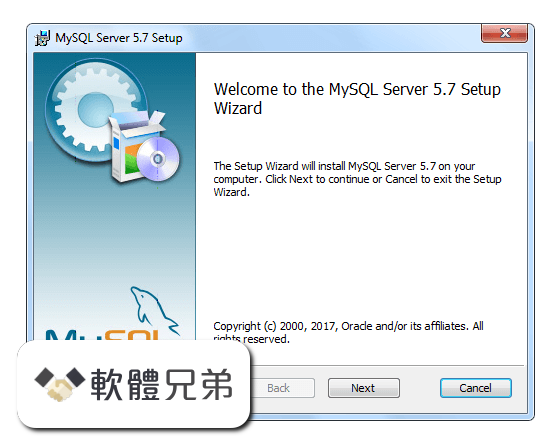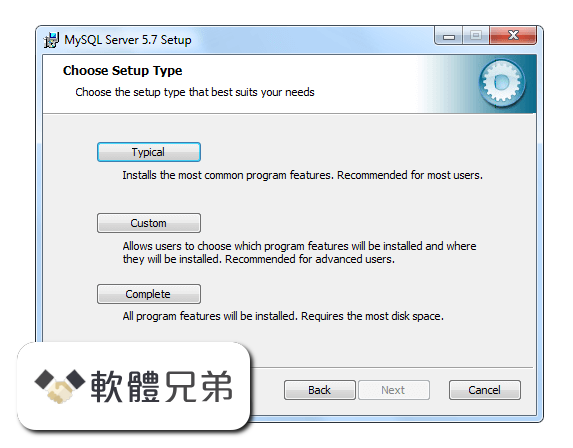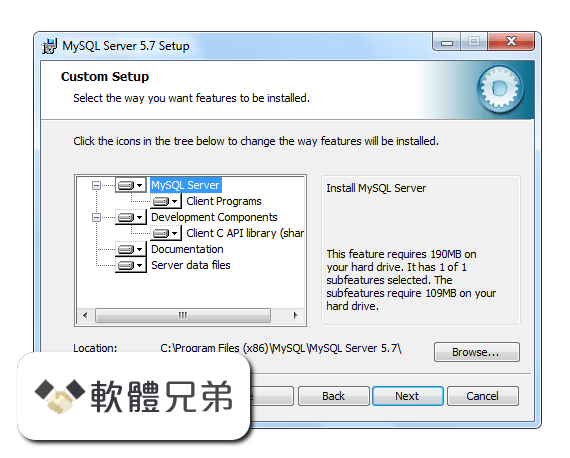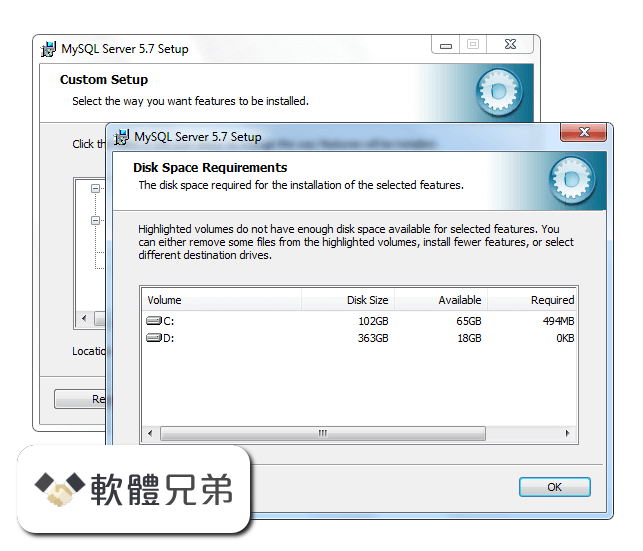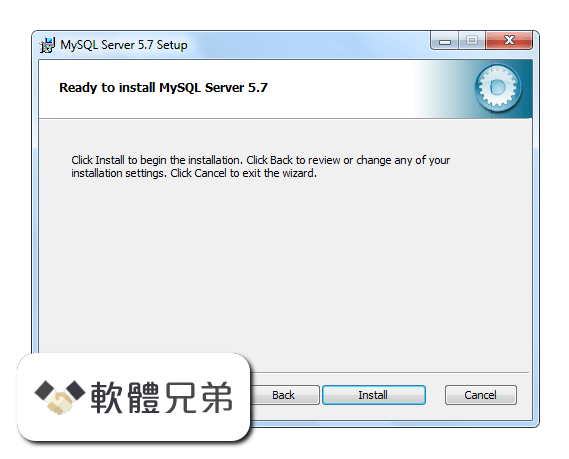|
What's new in this version: SECURITY NOTES:
- Previously, MySQL supported only the TLSv1 protocol for encrypting secure connections. TLS support is now extended to enable a higher level of encrypted connection security: when compiled using OpenSSL 1.0.1 or higher, MySQL supports the TLSv1, TLSv1.1, and TLSv1.2 protocols; when compiled using the bundled version of yaSSL, MySQL supports the TLSv1 and TLSv1.1 protocols.
- Because TLSv1.2 requires OpenSSL, support for this protocol is available in binary distributions only for MySQL Commercial Server, and not for MySQL Community Server (which is compiled using yaSSL). To enable TLSv1.2 support if you build from source, you must set the WITH_SSL CMake option to use OpenSSL.
- The tls_version system variable enables specifying at startup the TLS protocols permitted by the server. On the client side, the --tls-version option enables specifying the TLS protocols permitted per client invocation.
- The mysql_options() C API function has a new MYSQL_OPT_TLS_VERSION option that enables specifying from within the client library the TLS protocols permitted by a client program.
- By default, MySQL attempts to use the highest TLS protocol version available, depending on which SSL library was used to compile the server and client, which key size is used, and whether the server or client are restricted from using some protocols by means of tls_version/--tls-version.
- For more information, see Secure Connection Protocols and Ciphers.
FUNCTIONALITY ADDED OR CHANGED:
- InnoDB: Enabling the new innodb_background_drop_list_empty debug configuration option helps avoid test case failures by delaying table creation until the background drop list is empty. (Bug #21891560)
- InnoDB: The innodb_support_xa system variable, which enables support for two-phase commit in XA transactions, is deprecated. InnoDB support for two-phase commit in XA transactions is always enabled as of MySQL 5.7.10. Disabling innodb_support_xa is no longer permitted as it makes replication unsafe and prevents performance gains associated with binary log group commit.
- MySQL distributions now include lz4_decompress and zlib_decompress utilities that can be used to decompress mysqlpump output that was compressed using the --compress-output=LZ4 and --compress-output=ZLIB options. For more information, see lz4_decompress — Decompress mysqlpump LZ4-Compressed Output, and zlib_decompress — Decompress mysqlpump ZLIB-Compressed Output. (Bug #21644479)
- mysql_upgrade now attempts to print more informative errors than FATAL ERROR: Upgrade failed. (Bug #21489398)
- These client programs now support the --enable-cleartext-plugin option: mysqlcheck, mysqldump, mysqlimport, mysqlshow. This option enables the mysql_clear_password cleartext authentication plugin. (See The Cleartext Client-Side Authentication Plugin.) (Bug #21235226)
- These functions now produce warnings for invalid input: UNHEX(), INET_NTOA(), INET_ATON(), INET6_NTOA(), INET6_ATON(). Also, INET_ATON() now returns NULL and produces a warning for arguments that contain more than four groups of digits. (Bug #78856, Bug #22042027, Bug #78884, Bug #22071558)
BUGS FIXED:
- InnoDB: When attempting to create a cascading foreign key constraint on a primary key column used in a virtual index, the error message that was returned did not include information from dict_foreign_has_col_in_v_index(). (Bug #22050059)
- InnoDB: An in-place operation that rebuilt a table with multiple indexed virtual columns raised an assertion. (Bug #22018532)
- InnoDB: A SELECT ... FOR UPDATE operation on a table that only contained virtual columns and a virtual column index raised an invalid assertion. (Bug #21981164, Bug #21880930)
- InnoDB: The calculation in dict_index_node_ptr_max_size() that determines the maximum index record size treated fixed fields that exceeded the maximum column length as fixed-size fields instead of variable length fields. (Bug #21968191)
- InnoDB: A server exit during a TRUNCATE TABLE operation on a table with a full-text index caused startup to fail. (Bug #21959479)
- InnoDB: An ALTER TABLE ... DISCARD TABLESPACE operation raised an invalid assertion. (Bug #21957001, Bug #78728)
- InnoDB: Compared to previous releases, small tablespaces containing tables with BLOB values had larger data files due to regression introduced in MySQL 5.7.5. (Bug #21950389, Bug #78623)
- References: This bug is a regression of Bug #18756233.
- InnoDB: The ord_part flag was not reset after a failed operation to create an index on a virtual column, causing InnoDB to assert on a subsequent insert operation. (Bug #21941320, Bug #21979969)
- InnoDB: Successive open table operations on tables with virtual columns caused a memory access violation. (Bug #21939731)
- InnoDB: An invalid search tuple was created for a table with virtual columns. (Bug #21922176)
- InnoDB: InnoDB attempted to purge a virtual column index record that was not marked for deletion. (Bug #21901389)
- InnoDB: Update vector generation for a full-text search DOC_ID did not initialize a new ufield, resulting in an assertion. (Bug #21891185)
- InnoDB: InnoDB failed to prevent foreign key SET NULL or CASCADE constraints on virtual column base columns and virtual index columns. (Bug #21890816)
- InnoDB: An invalid comparison raised an assertion under a 64k innodb_page_size setting. (Bug #21882024)
- InnoDB: When estimating the maximum record size of a b-tree index page, InnoDB incorrectly treated long-length fixed fields (greater than 767 bytes) as fixed-size fields instead of variable length fields. (Bug #21880445)
- InnoDB: In debug builds, dtuple_get_n_fields attempted to read freed memory that was previously allocated for a virtual column tuple, resulting in a server exit. (Bug #21875974)
- InnoDB: Selecting from INNODB_CMPMEM with option big-tables=1 raised a buffer pool mutex assertion. (Bug #21871451, Bug #78494)
- InnoDB: InnoDB returned an invalid corruption-related error message during an IMPORT TABLESPACE operation. (Bug #21838158, Bug #77321)
- InnoDB: After a crash on Windows, copying the data directory to a non-Windows platform to perform the restore caused a crash recovery failure on startup. The code did not convert file path separators from “” to “/” in the redo log. (Bug #21825127, Bug #78410)
- InnoDB: A FLUSH TABLE ... FOR EXPORT operation asserted in row_quiesce_table_start() when run on a partitioned table with partitions residing in a system or general tablespace. (Bug #21796845)
- InnoDB: A DROP TABLE operation resulted in a server exit. The return value of a function call was not checked, which lead to dereferencing of a null pointer. The patch for this bug also addresses a potential race condition. (Bug #21794102, Bug #78336)
- InnoDB: In debug builds, an ordered scan across multiple partitions did not use a priority queue, resulting in an assertion. (Bug #21753477)
- InnoDB: After restarting the server, the COMPRESSION column of the INNODB_SYS_TABLESPACES table displayed incorrect data. The COMPRESSION column was removed from INNODB_SYS_TABLESPACES. To view the current setting for page compression, use SHOW CREATE TABLE. (Bug #21687636, Bug #78197)
- InnoDB: An invalid table flags value raised an assertion. The SYS_TABLES.MIX_LEN(flags2) value was not read for tables that use ROW_FORMAT=REDUNDANT. (Bug #21644827)
- InnoDB: An online ALTER TABLE operation caused a server exit. (Bug #21640679)
- InnoDB: An assertion was raised when crash recovery handling of an MLOG_TRUNCATE redo log record treated a shared tablespace as a file-per-table tablespace. Redo was skipped for the shared tablespace. (Bug #21606676)
- InnoDB: Transaction rollback after recovery failed due to an invalid assertion. (Bug #21575121)
- InnoDB: Insufficient information in the undo log about spatial columns raised an assertion and could result in a upgrade failure. Consequently, a slow shutdown is required prior to performing an in-place upgrade from MySQL 5.7.8 or 5.7.9 to 5.7.10 or higher. For more information, refer to Changes Affecting Upgrades to MySQL 5.7. (Bug #21508582)
- References: This bug is a regression of Bug #21340268.
- InnoDB: A secondary index is not permitted on a virtual column that is based on a foreign key-referenced column that uses ON DELETE CASCADE, ON DELETE SET NULL, ON UPDATE CASCADE, or ON UPDATE SET NULL. The restriction was not enforced. (Bug #21508402)
- InnoDB: A duplicate key error that occurred during an online DDL operation reported an incorrect key name. (Bug #21364096, Bug #77572)
- InnoDB: An ALTER TABLE operation caused the server to exit on disk full. (Bug #21326304, Bug #77497)
- InnoDB: The system tablespace data file did not extend automatically when reaching the file size limit, causing startup to fail with a size mismatch error and preventing the addition of another system tablespace data file. (Bug #21287796, Bug #77128)
- InnoDB: Altering the letter case of a column introduced an inconsistency between the frm file and data dictionary resulting in a failed CREATE INDEX operation on the altered column. (Bug #20755615)
- InnoDB: An ALTER TABLE operation that converted a table to an InnoDB file-per-table tablespace did not check for unknown files with the same name as the destination .idb file, permitting an unknown file of the same name to be overwritten. (Bug #19218794, Bug #73225)
- InnoDB: row_merge_read_clustered_index() did not handle a bulk load error correctly. (Bug #19163625)
- Partitioning: Partition scans did not evaluate virtual generated columns properly. This could cause issues with partitioned tables having an index on a virtual BLOB column. (Bug #21864838, Bug #21881155)
- Partitioning: While executing CHECK TABLE, when checking whether rows were in the correct partition, the partition engine missed updates for virtual generated columns. (Bug #21779554)
- Partitioning: Performing an in-place ALTER TABLE on a partitioned InnoDB table having one or more partitions which used a separate tablespace could cause the server to fail. (Bug #21755994)
- Partitioning: When all partitions were pruned, they were not initialized for scanning during initialization of indexes. This involved two related issues, one being that the active index was not set back to the maxmimum key value when the index was closed. In addition, when this occurred as part of a multi-range read, there were attempts to access unset variables. (Bug #78260, Bug #21754608, Bug #21620577)
- Replication: On a multi-threaded slave configured with master_info_repository=TABLE and relay_log_info_repository=TABLE which had previously been run with autocommit=1, if the slave was stopped and autocommit changed to 0, executing START SLAVE caused the session to appear to hang. After the lock wait timeout, when START SLAVE proceeded the server would stop unexpectedely. The fix ensures that when master_info_repository=TABLE, relay_log_info_repository=TABLE, and autocommit=0 a new transaction is generated for start and commit to avoid deadlocks. (Bug #21440793)
- Replication: Fatal errors encountered during flushing or synchronizing the binary log were being ignored. Such errors are now caught and handled depending on the setting of binlog_error_action. (Bug #76795, Bug #68953, Bug #20938915, Bug #16666407)
- INSERT ... ON DUPLICATE KEY UPDATE could result in a memory leak when executed as a prepared statement. (Bug #22151233)
- References: This bug was introduced by Bug #21908206.
- If the server was started with --performance_schema_accounts_size=0, querying the Performance Schema status variable tables caused a server exit. (Bug #22131713)
- For debug builds, using ALTER TABLE to add a generated column to a table could cause a deadlock. (Bug #22083048)
- Some of the source files for spatial functions in the sql directory took excessive compile time and required too much compiler memory allocation. (Bug #22078874)
- Internal buffer sizes in resolve_stack_dump were increased to accommodate larger symbol space requirements for C++ code. (Bug #22071592)
- The systemd unit file did not specify any --pid-file option for mysqld, with the result that server startup could fail. The unit file now includes a default --pid-file option in the ExecStart value. This default can be overridden in the override.conf file by changing both PIDFile and ExecStart to specify the PID file path name. (Bug #22066787)
- A query with nested derived tables and scalar subqueries in the select list of the derived tables might in some cases cause a server exit. (Bug #22062023)
- When mysqld was run with --initialize, it used chown() to set the data directory owner, even if ownership was already correct. This caused problems for AppArmor and SELinux. The server now checks whether the data directory owner is correct and skips the chown() call if so. (Bug #22041387)
- Failed evaluation of a generated column expression for CREATE TABLE or ALTER TABLE could cause a server exit. Now if expression evaluation causes truncation or provides incorrect input to a function, the statement terminates with an error and the DDL operation is rejected. (Bug #22018999)
- Creating a unique index on a virtual POINT column could result in an error or assertion for later table accesses. (Bug #22017616)
- Problems leading to Valgrind warnings for libmysqld were corrected. (Bug #22007587)
- Sending a load spike to a newly started server could cause the Performance Schema to allocate a large amount of memory, possibly leading to out-of-memory failure. (Bug #22006088)
- MySQL development RPM packages could fail to install if MySQL Connector/C development RPM packages were installed. (Bug #22005375)
- A missing error check could result in a server exit for DELETE statements that referred to user-defined variables. (Bug #21982313)
- Possible buffer overflow from incorrect use of strcpy() and sprintf() was corrected. (Bug #21973610)
- MySQL RPM packages for RHEL5 failed to create the mysql system user. (Bug #21950975)
- MySQL does not support columns of ROW type, but the server did not prevent generated columns from being created that used ROW expressions. These are now prohibited. (Bug #21940542)
- The version_tokens plugin called the locking service using a timeout value of only one second. The timeout is now taken from the default value of the lock_wait_timeout system variable (that is, one year). (Bug #21928198)
- Spatial functions could return invalid results if given a polygon or multipolygon argument containing holes such that a hole vertex touched the exterior ring at a point lying in the interior of an exterior ring segment. This could manifest itself as: ST_UNION() producing an invalid polygon; ST_SymDifference() producing an invalid multipolygon; ST_Intersection() producing an invalid self-intersecting polygon; ST_Difference() producing an invalid geometry. (Bug #21927733, Bug #21927639, Bug #21927558, Bug #21977775)
- With the STRICT_TRANS_TABLES SQL mode enabled, it was not possible to insert data into a VIRTUAL generated column defined with the NOT NULL attribute. (Bug #21927469)
- Problems leading to Valgrind warnings for OpenSSL random number generation were corrected. (Bug #21927436)
- Querying views on Windows could lead to memory leaks. (Bug #21908206)
- References: This bug was introduced by Bug #13901905.
- Generated column definitions specified with the NULL attribute resulted in a syntax error. (Bug #21900170)
- A stored procedure that used ST_Area() could return different numbers of rows for the first and second executions. (Bug #21889842)
- For polygon values with an interior ring that touches an exterior ring, ST_Buffer() could return invalid polygon values. (Bug #21871856)
- Two rows in the Performance Schema threads table could have the same THREAD_OS_ID value. (Bug #21865330)
- For debug builds, using ALTER TABLE to change the expression for a generated column could cause a server exit. (Bug #21854004)
- ALTER USER failed if the server was started with --skip-grant-tables. (Bug #21847825)
- Performance Schema reads of a session's THD structure while the session was running could create race conditions and result in a server exit. (Bug #21841412)
- A prepared statement that computes ST_IsSimple() or ST_Buffer_Strategy() on a nullable column in an outer join could return different numbers of rows for the first and second statement executions. (Bug #21841051)
- Queries on the Performance Schema variables_by_thread table could cause a server exit when examining the system variables of a new connection. (Bug #21840950)
- Executing HELP statements or statements involving the CONVERT_TZ() function could lead to a memory leak and to MyISAM reference-count errors at server shutdown. (Bug #21840241)
- Spatial functions could read already freed memory. (Bug #21823135)
- For Debian package control files, libnuma-dev was added to Build-Depends to enable NUMA support. (Bug #21822631)
- Selecting DECIMAL values into user-defined variables could cause a server exit. (Bug #21819304)
- Re-evaluation of a generated column expression could cause access to previously freed memory and a server exit. (Bug #21810529)
- MySQL did not recognize functional dependencies from base columns in a generated column expression to the generated column. (Bug #21807579)
- ST_SymDifference() could raise an assertion for polygons with self-intersection points. (Bug #21767301, Bug #79031, Bug #22124757)
- USER field output from the audit log plugin was malformed. (Bug #21766380)
- A server exit could occur for queries for which a) a GROUP BY included primary key and secondary key columns; and b) the WHERE clause included an equality predicate on the first primary key column where that column was constant. (Bug #21761044)
- Building MySQL using parallel compilation sometimes failed with an attempt to compile sql_yacc.yy before lex_token.h had been created. (Bug #21680733)
- With binary logging enabled, issuing DROP TEMPORARY TABLE when in XA_IDLE state caused an assertion to be raised. Now an ER_XAER_RMFAIL error is returned.
- In consquence of the fix for this issue, statements that previously succeeded in XA_IDLE state now fail with an ER_XAER_RMFAIL error. When running with --gtid-mode=ON, an explicit DROP continues to fail with ER_GTID_UNSAFE_CREATE_DROP_TEMPORARY_TABLE_IN_TRANSACTION. (Bug #21638823)
- A query with a subquery in the left-hand part of an IN subquery that was transformed into a semi-join might cause a server exit. (Bug #21606400)
- Concurrent FLUSH PRIVILEGES and REVOKE or GRANT statements could produce a small time window during which invalid memory access to proxy user information could occur, leading to a server exit. (Bug #21602056)
- Using WITH ROLLUP within a subquery could cause a server exit. (Bug #21575790)
- For debug builds, a call to MAKE_SET() with a subquery as argument might be evaluated before tables were locked, causing an assertion to be raised. (Bug #21547779)
- Starting the server with the query_alloc_block_size system variable set to certain negative values on a machine without enough memory could result in out-of-memory errors. (Bug #21503595)
- Using UNINSTALL PLUGIN to uninstall the daemon_example plugin could cause a server exit. (Bug #21467458)
- FLUSH DES_KEY_FILE failed to reload the DES key file. (Bug #21370329)
- If an error occurred during the setup phase of subquery materialization used to compute an IN predicate, cleanup of the temporary table did not happen, leading to Valgrind errors. (Bug #21346081)
- On Windows, the sysbench benchmark tool's "run" command would hang when attempting to create multiple tables for the OLTP test when using shared memory connections. (Bug #21319192, Bug #77481)
- Queries rejected by MySQL Enterprise Firewall were truncated to 512 characters when written to the error log. (Bug #20948270)
- A server exit could occur for the second execution of a prepared statement for which an ORDER BY clause referred to a column position. (Bug #20755389)
- Repeated execution of a prepared statement could cause a server exit if the default database was changed. (Bug #20447262)
- mysql_plugin could exit due to improper checking of string operation operands. (Bug #20376670)
- After failure to create a temporary table during join processing and releasing the table descriptor, an attempt to access the now-invalid descriptor could cause a server exit. (Bug #19918299)
- Type conversion failure for DECIMAL values could cause a server exit. (Bug #19912326, Bug #20013538)
- INSERT DELAYED could cause a server exit for tables partitioned with a character column as the key and for which the expression required a character set conversion. (Bug #19894161)
- A server exit could occur when updating a view using an ALL comparison operator on a subquery that selects from an indexed column in the main table. (Bug #19434916)
- With AddressSanitizer (ASAN) enabled, triggers that contained null or invalid characters could cause an ASAN server exit. (Bug #18831513)
- Incorrect error checking for the NAME_CONST() function could lead to a server exit. (Bug #17733850)
- Queries that needed to store the result of ST_AsWKB() in a temporary table could fail with an error message. (Bug #79060, Bug #22131961)
- References: This bug was introduced by Bug #21614368.
- If mysqld was started with the --help option, it created a binary log index file. If that file was located in the data directory and the command preceded data directory initialization, initialization then failed due to a nonempty data directory. (Bug #78986, Bug #22107047)
- mysqladmin --help displayed the old-password command, even though the command itself was removed in MySQL 5.7.5. (Bug #78774, Bug #21972941)
- The filename character set is intended for internal use, but references to it in SQL statements did not produce an error. Now they do. (Bug #78732, Bug #21958734)
- If a generated column used an expression that is affected by the SQL mode, the expression could produce different results for the same input values, depending on the current SQL mode. (For example, interpretation of the || operator depends on the PIPES_AS_CONCAT SQL mode.) Now expression evaluation uses the SQL mode in effect at the time the column is defined. (Bug #78665, Bug #21929967)
- Casting large hexadecimal values could produce an incorrect result and no truncation warning. (Bug #78641, Bug #21922414)
- mysqlpump generated incorrect ALTER TABLE statements for adding foreign keys. (Bug #78593, Bug #21907297)
- The error message returned when trying to define a BLOB, TEXT, JSON, or GEOMETRY column with a default value (Error 1101, ER_BLOB_CANT_HAVE_DEFAULT) referred to BLOB and TEXT columns only. The same error applies to any of these four types when trying to use the DEFAULT option with it in a column definition; the corresponding error message now makes this clear by referring to JSON and GEOMETRY columns as well. (Bug #78527, Bug #21887035)
- A query using JSON_EXTRACT() returned the wrong result after a virtual index was added to the table. (Bug #78464, Bug #21854241)
- It was possible to store non-ASCII data in columns intended to store data of character set ascii. (Bug #78276, Bug #21774967)
- Adding a SPATIAL index to a MyISAM table could cause the cardinality of other indexes to become incorrect. (Bug #78213, Bug #21789000)
- MySQL could fail to compile on Solaris 11.3 when /usr/gnu/bin/as was used as the linker. (Bug #77797, Bug #21484716)
- Some punctuation characters in the armscii8 character set are represented by two encodings, with the result that a character stored using one encoding would not be found using a search with the other encoding. For such characters, MySQL now selects the encoding with the lowest value to consistently map instances onto the same encoding. (Bug #77713, Bug #21441405)
- Item_copy_decimal::copy() did not take the div_precision_increment system variable value into account, resulting in DECIMAL values being returned with incorrect precision from some queries. (Bug #77634, Bug #21462523)
- For queries with implicit grouping; an index with a string column as its first part; and a WHERE clause with an equality comparison comparing the column to a string with trailing characters in addition to the column value, an aggregate function that should return NULL returned non-NULL. (Bug #77480, Bug #21318711)
- LOAD_FILE() could cause a server exit for some pathnames if the character set was cp932. (Bug #76555, Bug #20819220)
- For constructs such as ORDER BY numeric_expr COLLATE collation_name, the character set of the expression was treated as latin1, which resulted in an error if the collation specified after COLLATE is incompatible with latin1. Now when a numeric expression is implicitly cast to a character expression in the presence of COLLATE, the character set used is the one associated with the named collation. (Bug #73858, Bug #20425399)
MySQL 5.7.10 (32-bit) 相關參考資料
2.3 Installing MySQL on Microsoft Windows
MySQL is available for Microsoft Windows, for both 32-bit and 64-bit versions. For supported Windows platform information, see https://www.mysql.com/support/ ...
https://docs.oracle.com
Download MySQL Community Server
MySQL Community Server 8.4.0 LTS ; Linux - Generic (glibc 2.28) (x86, 64-bit), Compressed TAR Archive Test Suite, 8.4.0, 339.7M ; (mysql-test-8.4.0-linux-glibc2.
https://dev.mysql.com
Download MySQL Community Server (Archived Versions)
8.0.32, 8.0.31, 8.0.30, 8.0.28, 8.0.27, 8.0 ... 5.7.10, 5.7.9, 5.7.8 rc, 5.7.7 rc, 5.7.6 m16, 5.7.5 ... Linux - Generic (glibc 2.28) (x86, 64-bit), Compressed TAR ...
https://downloads.mysql.com
Download MySQL Installer
Note: MySQL Installer is 32 bit, but will install both 32 bit and 64 bit binaries. Online Documentation. MySQL Installer Documentation and Change History.
https://dev.mysql.com
Download MySQL Installer (Archived Versions)
To download the latest release of MySQL Installer, please visit MySQL Downloads. Product Version: 8.0.36, 8.0.35, 8.0.34, 8.0.33, 8.0.32 ... 5.7.10, 5.7.9, 5.7.8 ...
https://downloads.mysql.com
MySQL 5.7.10 (32-bit) Download
2015年12月7日 — Download MySQL 5.7.10 (32-bit) for Windows PC from FileHorse. 100% Safe and Secure ✓ Free Download 64-bit Software Version.
https://www.filehorse.com
Percona Server for MySQL 5.7.10-2 (2016-02-05)
2022年9月27日 — Do you need to stay on MySQL 5.7 a bit longer? ... Based on MySQL 5.7.10, including all ... bit integer, will not fit into a signed 32-bit integer.
https://docs.percona.com
win10 安装mysql 5.7 msi版原创
2020年5月26日 — 2、根据自己的需求进行下载,这里选择的是Windows (x86, 32-bit), MSI Installer( mysql-installer-web-community-8.0.19.0.msi) 【注】mysql-installer- ...
https://blog.csdn.net
安装Mysql最新版本mysql-5.7.10-winx64出现的几个问题解决
2015年12月12日 — 电脑是64位的安装不了Windows (x86, 32-bit),Mysql installer MSI ,然后下载了Windows (x86, 32-bit), ZIP Archive 这种是免安装直接解压使用的, ...
https://blog.csdn.net
|
